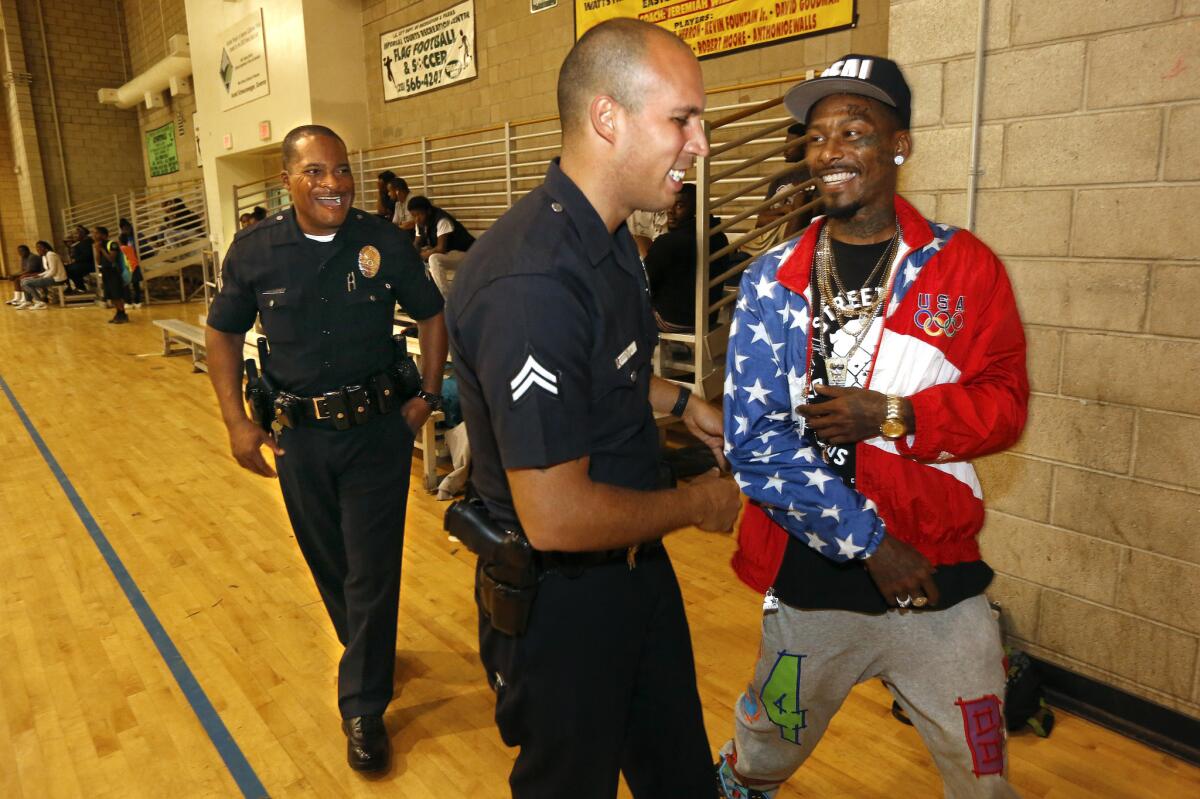The LAPD won’t stop traumatizing black Angelenos until it abandons its ‘warrior culture’

- Share via
Over decades as a civil rights lawyer, I have sued police departments, represented victims and whistle-blower officers and, for 16 years, worked closely with Los Angeles Police Department Chiefs William J. Bratton and Charlie Beck as they tried to transform policing in the city.
As Americans march in outrage over the videotaped police killing of George Floyd, many have asked me whether the LAPD has improved at all since the 1991 beating of Rodney King.
The answer is yes, and for the better. But we have a long way to go before men like Rodney King and Floyd would claim it as a department that protects and serves them.
I know many good officers who risk their lives to protect rather than hunt residents of black neighborhoods; officers who serve the code of truth, not the code of silence; who divert poor black and Latino children away from gangs and the prison pipeline. I know their valor, compassion and integrity first-hand. And I know that they are a minority, both within the predominant warrior culture of American policing and within the LAPD.
With civilian and court help, progressive police leaders have improved discipline, reduced police killings, banned chokeholds, engaged with community leaders and made other changes that are seismic in the world of policing.
In most of black America, however, those changes have meant little.
Progress at the top did not help George Floyd, Walter Scott , Philando Castille or the hundreds of victims whose abuse wasn’t recorded. Even in cities that made real changes, like Los Angeles, the progress has failed to end an entrenched warrior culture of impunity, or the “thin blue line” mindset of us versus them. Most departments still use toxic tactics like stop-and-frisk.
This kind of dehumanizing policing has turned the poorest black and brown neighborhoods into gulags. A black man living in the ZIP code that includes the Nickerson Gardens housing projects in Watts now faces a 70% to 80% chance of being incarcerated at some point in his life, according to research conducted by Raj Chetty at Harvard. That statistic is as unacceptable as what happened to Floyd.
Disciplined warrior cops will always be needed to respond to the direst dangers. But unchecked warrior culture leads to the aggression seen in the use of Tasers on unresisting students in Atlanta, the shoving of a 75-year-old man to the ground in Buffalo, N.Y., and televised baton strikes against peaceful protesters in Los Angeles. We saw its most extreme expression in the casual malevolence of the Floyd killing.
Under warrior policing, communities on the right side of the “thin blue line” receive safety and protection; communities on the wrong side receive suppression and prison. Folks living on the right side of that police line do not ask officers to kill the unarmed, but they do expect them to contain neighborhoods on the wrong side of the line, and they blind themselves to the kind of search-and-destroy tactics that feed mass incarceration.
The good news is, we know how to change this.
In 2010, then-LAPD Chief Beck and activists created the Community Safety Partnership, a holistic, problem-solving approach to safety for high-crime areas that minimizes suppression, maximizes trust and acts through partnerships among residents, gang interventionists, local leaders, experts and other agencies to remove the root causes of trauma and crime. A recent UCLA evaluation found that reductions in violent crime and gang control in these partnership sites exceeded countywide declines, and the gains were accomplished with far fewer arrests and no police shootings or beatings. Moreover, residents reported higher trust in Community Safety Partnership officers.
Residents of neighborhoods traumatized by gang violence, predatory policing, endemic poverty and mass incarceration do not report seeing significant improvement in policing since 1992. The exception was residents in partnership sites.
Warrior enforcement culture needs to be replaced with this kind of guardian-style approach that rewards problem-solving engagement between officers and the communities they protect.
The less good news is that the work to institutionalize this approach will be challenging. Fully replacing warrior DNA with guardian DNA is a battle for the soul of policing that LAPD has just begun. And that’s not the only fight we have to win.
After the 1965 Watts riots, the McCone Commission concluded that preventing future unrest required two things: ending police mistreatment and addressing “the spiral of despair” caused by entrenched poverty.
We haven’t even begun to address that second crisis.
The cause for hope is that we know how to fix policing. The cause for inspiration is the multiracial army marching across the nation demanding that black lives matter. The protesters have served notice that the consent of the governed for predatory policing and industrialized racial injustice has been revoked. As the sign held by a little girl with long blond hair marching in Chicago put it, “Shut the Whole Damned System Down.”
Thanks to them, we have one last chance to, finally, overcome.
Connie Rice, a former member of President Barack Obama’s Taskforce on 21st Century Policing, is a civil rights attorney and author of “Power Concedes Nothing.”
More to Read
A cure for the common opinion
Get thought-provoking perspectives with our weekly newsletter.
You may occasionally receive promotional content from the Los Angeles Times.









